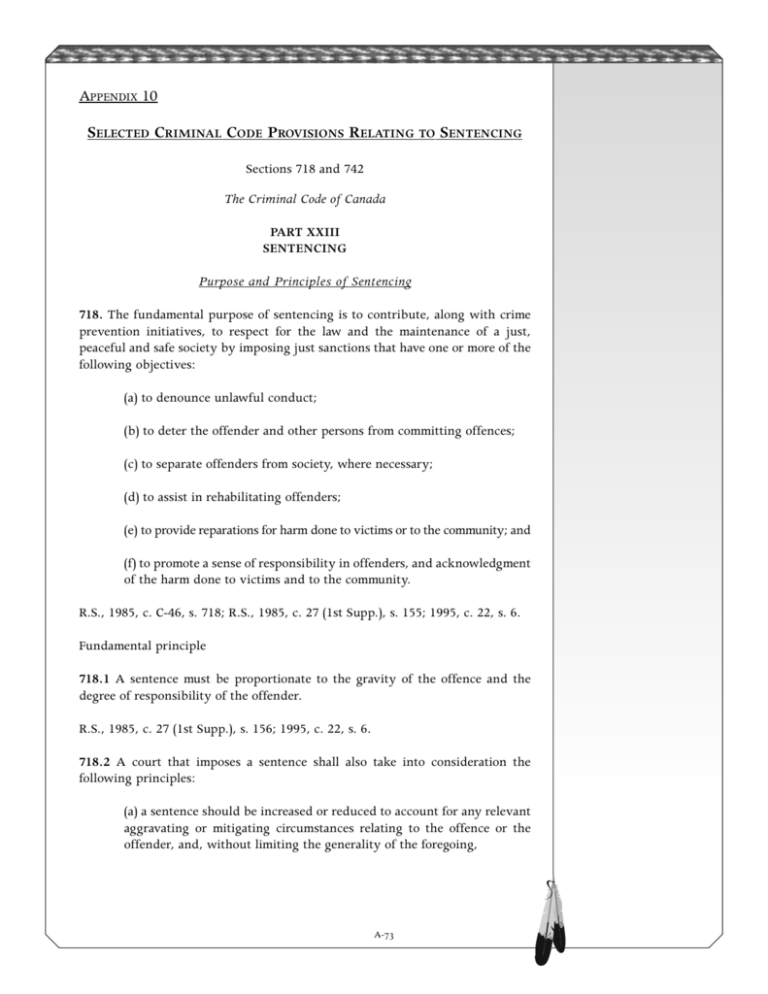Selected Criminal Code Provisions Relating to Sentencing
advertisement

APPENDIX 10 SELECTED CRIMINAL CODE PROVISIONS RELATING TO SENTENCING Sections 718 and 742 The Criminal Code of Canada PART XXIII SENTENCING Purpose and Principles of Sentencing 718. The fundamental purpose of sentencing is to contribute, along with crime prevention initiatives, to respect for the law and the maintenance of a just, peaceful and safe society by imposing just sanctions that have one or more of the following objectives: (a) to denounce unlawful conduct; (b) to deter the offender and other persons from committing offences; (c) to separate offenders from society, where necessary; (d) to assist in rehabilitating offenders; (e) to provide reparations for harm done to victims or to the community; and (f) to promote a sense of responsibility in offenders, and acknowledgment of the harm done to victims and to the community. R.S., 1985, c. C-46, s. 718; R.S., 1985, c. 27 (1st Supp.), s. 155; 1995, c. 22, s. 6. Fundamental principle 718.1 A sentence must be proportionate to the gravity of the offence and the degree of responsibility of the offender. R.S., 1985, c. 27 (1st Supp.), s. 156; 1995, c. 22, s. 6. 718.2 A court that imposes a sentence shall also take into consideration the following principles: (a) a sentence should be increased or reduced to account for any relevant aggravating or mitigating circumstances relating to the offence or the offender, and, without limiting the generality of the foregoing, A-73 (i) evidence that the offence was motivated by bias, prejudice or hate based on race, national or ethnic origin, language, colour, religion, sex, age, mental or physical disability, sexual orientation, or any other similar factor, (ii) evidence that the offender, in committing the offence, abused the offender’s spouse or common-law partner or child, (iii) evidence that the offender, in committing the offence, abused a position of trust or authority in relation to the victim, (iv) evidence that the offence was committed for the benefit of, at the direction of or in association with a criminal organization, or (v) evidence that the offence was a terrorism offence shall be deemed to be aggravating circumstances; (b) a sentence should be similar to sentences imposed on similar offenders for similar offences committed in similar circumstances; (c) where consecutive sentences are imposed, the combined sentence should not be unduly long or harsh; (d) an offender should not be deprived of liberty, if less restrictive sanctions may be appropriate in the circumstances; and (e) all available sanctions other than imprisonment that are reasonable in the circumstances should be considered for all offenders, with particular attention to the circumstances of aboriginal offenders. 1995, c. 22, s. 6; 1997, c. 23, s. 17; 2000, c. 12, s. 95; 2001, c. 32, s. 44(F), c. 41, s. 20. Punishment Generally 718.3 (1) Where an enactment prescribes different degrees or kinds of punishment in respect of an offence, the punishment to be imposed is, subject to the limitations prescribed in the enactment, in the discretion of the court that convicts a person who commits the offence. (2) Where an enactment prescribes a punishment in respect of an offence, the punishment to be imposed is, subject to the limitations prescribed in the enactment, in the discretion of the court that convicts a person who commits the offence, but no punishment is a minimum punishment unless it is declared to be a minimum punishment. (3) Where an accused is convicted of an offence punishable with both fine and imprisonment and a term of imprisonment in default of payment of the fine is not A-74 specified in the enactment that prescribes the punishment to be imposed, the imprisonment that may be imposed in default of payment shall not exceed the term of imprisonment that is prescribed in respect of the offence. (4) The court or youth justice court that sentences an accused may direct that the terms of imprisonment that are imposed by the court or the youth justice court or that result from the operation of subsection 734(4) or 743.5(1) or (2) shall be served consecutively, when (a) the accused is sentenced while under sentence for an offence, and a term of imprisonment, whether in default of payment of a fine or otherwise, is imposed; (b) the accused is found guilty or convicted of an offence punishable with both a fine and imprisonment and both are imposed; (c) the accused is found guilty or convicted of more than one offence, and (i) more than one fine is imposed, (ii) terms of imprisonment for the respective offences are imposed, or (iii) a term of imprisonment is imposed in respect of one offence and a fine is imposed in respect of another offence; or (d) subsection 743.5(1) or (2) applies. 1995, c. 22, s. 6; 1997, c. 18, s. 141; 2002, c. 1, s. 182. Conditional Sentence of Imprisonment 742. In sections 742.1 to 742.7, “change”, in relation to optional conditions, includes deletions and additions; “optional conditions” means the conditions referred to in subsection 742.3(2); “supervisor” means a person designated by the Attorney General, either by name or by title of office, as a supervisor for the purposes of sections 742.1 to 742.7. R.S., 1985, c. C-46, s. 742; R.S., 1985, c. 27 (1st Supp.), s. 165; 1992, c. 11, s. 15; 1995, c. 22, s. 6. 742.1 Where a person is convicted of an offence, except an offence that is punishable by a minimum term of imprisonment, and the court (a) imposes a sentence of imprisonment of less than two years, and A-75 (b) is satisfied that serving the sentence in the community would not endanger the safety of the community and would be consistent with the fundamental purpose and principles of sentencing set out in sections 718 to 718.2, the court may, for the purpose of supervising the offender’s behaviour in the community, order that the offender serve the sentence in the community, subject to the offender’s complying with the conditions of a conditional sentence order made under section 742.3. 1992, c. 11, s. 16; 1995, c. 19, s. 38, c. 22, s. 6; 1997, c. 18, s. 107.1. A-76






